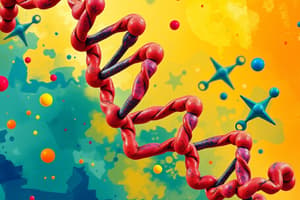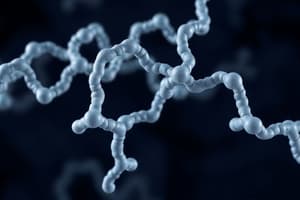Podcast
Questions and Answers
Which amino acid is classified as basic?
Which amino acid is classified as basic?
- Glutamine
- Valine
- Histidine (correct)
- Methionine
What is the primary structure of a protein?
What is the primary structure of a protein?
- The interaction between multiple polypeptide chains
- The overall three-dimensional shape of the protein
- The local folded structures stabilized by hydrogen bonds
- The sequence of amino acids and the positioning of disulfide bonds (correct)
Which process occurs at the ribosome during protein assembly?
Which process occurs at the ribosome during protein assembly?
- Polymerization of amino acids attached to tRNA (correct)
- Folding of the polypeptide into its tertiary structure
- Separation of subunits in quaternary structure
- Disulphide bond formation between cysteine residues
What was the first protein to be sequenced using chemical methods?
What was the first protein to be sequenced using chemical methods?
Which amino acid is identified by the one-letter code 'F'?
Which amino acid is identified by the one-letter code 'F'?
How has automated chemical sequencing improved since the 1970s?
How has automated chemical sequencing improved since the 1970s?
Which level of protein structure describes the folding process?
Which level of protein structure describes the folding process?
Which of the following statements about amino acids is incorrect?
Which of the following statements about amino acids is incorrect?
What primarily determines the specific sequence of amino acids in a polypeptide chain?
What primarily determines the specific sequence of amino acids in a polypeptide chain?
Which technique can be used to determine the conformation of proteins?
Which technique can be used to determine the conformation of proteins?
What characterizes conjugated proteins?
What characterizes conjugated proteins?
Which of the following best describes simple proteins?
Which of the following best describes simple proteins?
What is the primary role of upstream processing in the context of biopharmaceuticals?
What is the primary role of upstream processing in the context of biopharmaceuticals?
Which component is NOT considered a prosthetic group in proteins?
Which component is NOT considered a prosthetic group in proteins?
Which types of cells are utilized as sources for biopharmaceutical production?
Which types of cells are utilized as sources for biopharmaceutical production?
What aspect of pharmaceutical biotechnology does metabolomics serve as a tool for?
What aspect of pharmaceutical biotechnology does metabolomics serve as a tool for?
What is the primary function of DNA in relation to amino acids?
What is the primary function of DNA in relation to amino acids?
Which of the following represents a stop codon in the genetic code?
Which of the following represents a stop codon in the genetic code?
In which cellular compartment does protein folding primarily occur?
In which cellular compartment does protein folding primarily occur?
What is a characteristic of tertiary protein structure?
What is a characteristic of tertiary protein structure?
What is the relationship between primary and secondary protein structures?
What is the relationship between primary and secondary protein structures?
How does secondary protein structure contribute to overall protein functionality?
How does secondary protein structure contribute to overall protein functionality?
Which of the following statements is true about codons?
Which of the following statements is true about codons?
Which amino acid is encoded by the codon TTT?
Which amino acid is encoded by the codon TTT?
What type of interactions are involved in protein folding?
What type of interactions are involved in protein folding?
What structures emerge from the interactions of multiple polypeptide chains?
What structures emerge from the interactions of multiple polypeptide chains?
What is the defining characteristic of secondary protein structures?
What is the defining characteristic of secondary protein structures?
Which term refers to the overall folding of an entire polypeptide chain into a specific 3D shape?
Which term refers to the overall folding of an entire polypeptide chain into a specific 3D shape?
Which of the following best describes quaternary structure?
Which of the following best describes quaternary structure?
What can happen if a protein is folded incorrectly?
What can happen if a protein is folded incorrectly?
In which part of the cell does protein packing occur?
In which part of the cell does protein packing occur?
What do the terms 'class' and 'motif' refer to in protein structure?
What do the terms 'class' and 'motif' refer to in protein structure?
What is the role of hydrogen bonding in secondary protein structures?
What is the role of hydrogen bonding in secondary protein structures?
How do tertiary and quaternary structures differ from each other?
How do tertiary and quaternary structures differ from each other?
Flashcards are hidden until you start studying
Study Notes
Protein Structure
- Proteins are macromolecules made up of one or more polypeptide chains
- Polypeptides consist of a chain of amino acids linked by peptide bonds
- Each amino acid sequence is determined by the gene that encodes for that specific polypeptide
- The structure of a protein cannot be predicted from its amino acid sequence
- Protein conformation can be determined using techniques like X-ray diffraction and nuclear magnetic resonance spectroscopy
- Proteins are classified as simple proteins (consisting only of polypeptide chains) or conjugated proteins (contain non-polypeptide constituents)
- Common prosthetic groups found in proteins include carbohydrates (glycoproteins), phosphate groups (phosphoproteins), vitamin derivatives (e.g., flavoproteins), and metal ions (metalloproteins)
Amino Acids
- There are 20 commonly occurring amino acids
- Each amino acid is made up of an amino group, a carboxylic acid group, and a side chain (R)
- The side chain determines the properties of each amino acid (neutral, acidic, or basic)
Protein Assembly
- Occurs at the ribosome
- Involves the polymerization of amino acids attached to tRNA
- Results in the primary structure of a protein
Primary Structure
- Refers to the exact amino acid sequence, along with the positioning of disulfide (-S-S-) bonds
- The primary structure is determined by DNA base sequence in a gene
Protein Folding
- Occurs in the cytosol
- Involves localized spatial interaction among primary structure elements
- Leads to the secondary structure of a protein
- Protein function depends on correct folding
- Misfolded proteins can lose their function or be detrimental
Secondary Structure
- Non-linear and three-dimensional
- Localized to regions of an amino acid chain
- Formed and stabilized by hydrogen bonding
- Two types of secondary structure: alpha-helix and beta-sheet
Protein Packing
- Occurs in the cytosol
- Involves interaction between secondary structure elements and solvent
- Results in the tertiary structure of a protein
Tertiary Structure
- Non-linear and three-dimensional
- Refers to the overall folding of the entire polypeptide chain into a specific 3D shape
Protein Interaction
- Occurs in the cytosol, in close proximity to other folded and packed proteins
- Involves interaction among tertiary structure elements of separate polymer chains
Quaternary Structure
- Non-linear and three-dimensional
- Describes the way in which different subunits are packed together to form the overall structure of a protein
- Many proteins are formed from more than one polypeptide chain
Protein Class/Motif/Fold
- Class refers to secondary structure composition (all α, all β, α+β)
- Motif refers to small, specific combinations of secondary structure elements (e.g., β-α-β loop)
- Fold refers to the overall shape and orientation of secondary structures, ignoring connectivity, and defines the architecture of a protein
Studying That Suits You
Use AI to generate personalized quizzes and flashcards to suit your learning preferences.




